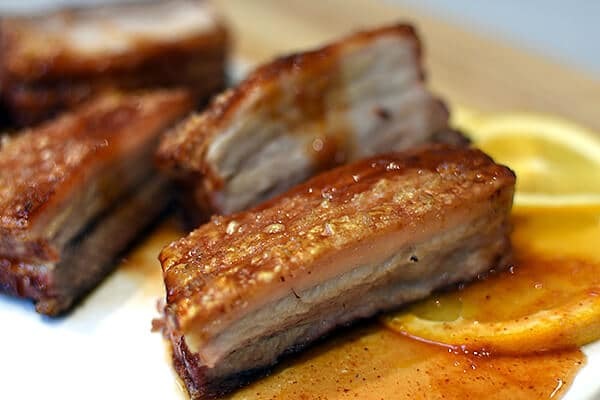Five Spice Pork Belly with Orange and Quince Glaze

Crunchy, salty, pork crackling pairs perfectly with this sweet and tart, orange and quince glaze.
Ensure your barbecue is clean and free from any grease or debris. Prepare the barbecue for indirect cooking over high heat (230° to 260°C). If using a Weber® Q barbecue, set up your barbecue with a convection tray and a trivet.
Dry the skin of the pork with paper towel. If the skin has a lot of moisture in it, leave uncovered in the refrigerator overnight. Score the skin if the butcher hasn’t done so already. Score through the rind and just into the fat, about 3mm deep and at 1cm intervals.
In a small bowl mix together the Chinese five spice and 1 teaspoon of the olive oil to make a paste. Flip the pork belly over so the skin side is facing down. Rub the paste all over the pork flesh, taking care to not get the paste on the skin. Flip the pork belly back over and drizzle the remaining 1 teaspoon olive oil and sprinkle the sea salt over the skin and rub in.
Roast the pork over indirect high heat, with the lid closed, for 20 to 30 minutes to crackle the skin; avoid lifting the lid during this time.
Adjust the barbecue temperature to indirect medium heat (190° to 230°C), the roast setting, and continue to cook over indirect medium heat for a further 30 minutes, or until the internal temperature reaches 60°C for a medium result. The internal temperature will continue to rise 3°C to 6°C while resting (final doneness temperature for Pork is 63°C for medium, 68°C for medium well).
While the pork belly is cooking, place all of the glaze ingredients into a saucepan. Heat the glaze on a side burner or stove top over high heat, and bring to the boil. Reduce the heat to a gentle simmer and cook until the glaze is reduced and is slightly thickened, about 10 minutes.
Once the pork belly is cooked, allow to rest for 10 to 15 minutes before serving. Cut the pork belly into thick slices and serve with the warm glaze.
Avoid buying vacuum sealed pork, which has been packed in plastic, as it is much harder to crackle.
If the skin is pale and not dry, leave uncovered in the refrigerator for 24 to 48 hours to dry out the skin. You can cover the flesh with plastic wrap to prevent the flesh from also drying out.
To calculate the cooking time for your roast, measure the thickness (not length) of the roast and calculate 1 minute per millimetre. For example, the pictured roast measured 50mm thick, therefore the cooking time was 50 minutes. Alternatively use an internal meat thermometer.
If the pork has cooked but the rind hasn’t crackled, remove the rind and return the rind to the barbecue and roast over indirect medium heat (190°C to 230°C) for 15 minutes to crackle whilst the pork roast is resting.
Ingredients
Directions
Ensure your barbecue is clean and free from any grease or debris. Prepare the barbecue for indirect cooking over high heat (230° to 260°C). If using a Weber® Q barbecue, set up your barbecue with a convection tray and a trivet.
Dry the skin of the pork with paper towel. If the skin has a lot of moisture in it, leave uncovered in the refrigerator overnight. Score the skin if the butcher hasn’t done so already. Score through the rind and just into the fat, about 3mm deep and at 1cm intervals.
In a small bowl mix together the Chinese five spice and 1 teaspoon of the olive oil to make a paste. Flip the pork belly over so the skin side is facing down. Rub the paste all over the pork flesh, taking care to not get the paste on the skin. Flip the pork belly back over and drizzle the remaining 1 teaspoon olive oil and sprinkle the sea salt over the skin and rub in.
Roast the pork over indirect high heat, with the lid closed, for 20 to 30 minutes to crackle the skin; avoid lifting the lid during this time.
Adjust the barbecue temperature to indirect medium heat (190° to 230°C), the roast setting, and continue to cook over indirect medium heat for a further 30 minutes, or until the internal temperature reaches 60°C for a medium result. The internal temperature will continue to rise 3°C to 6°C while resting (final doneness temperature for Pork is 63°C for medium, 68°C for medium well).
While the pork belly is cooking, place all of the glaze ingredients into a saucepan. Heat the glaze on a side burner or stove top over high heat, and bring to the boil. Reduce the heat to a gentle simmer and cook until the glaze is reduced and is slightly thickened, about 10 minutes.
Once the pork belly is cooked, allow to rest for 10 to 15 minutes before serving. Cut the pork belly into thick slices and serve with the warm glaze.
Avoid buying vacuum sealed pork, which has been packed in plastic, as it is much harder to crackle.
If the skin is pale and not dry, leave uncovered in the refrigerator for 24 to 48 hours to dry out the skin. You can cover the flesh with plastic wrap to prevent the flesh from also drying out.
To calculate the cooking time for your roast, measure the thickness (not length) of the roast and calculate 1 minute per millimetre. For example, the pictured roast measured 50mm thick, therefore the cooking time was 50 minutes. Alternatively use an internal meat thermometer.
If the pork has cooked but the rind hasn’t crackled, remove the rind and return the rind to the barbecue and roast over indirect medium heat (190°C to 230°C) for 15 minutes to crackle whilst the pork roast is resting.
